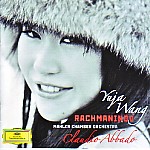We live in strange times. When the repertoire comes from the classical or baroque periods, “authenticity” is the rage. In this music, we know what constitutes an authentic style: we have the composer’s own recordings and a continuous performance tradition more than a century old. So what could be more logical than playing both works with a chamber orchestra, reduced strings, and the barest minimum of expressive passion? Of course, Yuja Wang has an excellent technique, including an exquisite pianissimo touch that she’s anxious to display whether the music asks for it or not. But the interpretations are abstractions, cold as ice, encouraged by Claudio Abbado’s chronic failure to do anything to the music beyond manipulate the minutiae of dynamics.
The Rhapsody comes off best, perhaps because it proceeds as short sections rather than large paragraphs. Still, Wang vanishes almost entirely in the 16th variation, and it’s impossible to pretend that the strings have the heft for the famous 18th. The forward balance of the piano doesn’t prevent her from sounding timid and small most of the time, and doesn’t disguise what seems to be an errant glockenspiel player just before the final climax of the Dies Irae theme. Both Earl Wild and Zoltan Kocsis show that you can be swift but also passionate, virtuosic, and powerful. Next to them (never mind Rubinstein/Reiner in this same coupling), this is weak beer.
The concerto is even worse. Wang’s launching of the first movement has to stand among the least impressive on disc. All three movements sound basically the same; there just isn’t enough contrast in what turns out to be a directionless dawdle through the work. The finale spurts ahead about four minutes in, but by then it’s way too little, too late. Abbado, in any case, never has had any particular feeling for this repertoire, and now we know why. For her part, Wang’s contribution is entirely typical of the modern aesthetic: light, cool, technically immaculate, and expressively neutral. No way is she ready to take on this music, even if she can play the notes. The live audience (in the concerto) goes nuts at the end, perhaps because they finally get to leave. [3/14/2011]
































